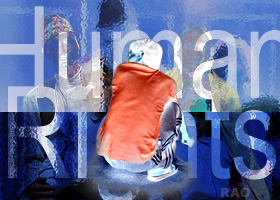
|

|
|
|
|
| Nepal 2008: Human Rights |
|
|
|
|
|
| Subhash Singh: Nepal, the deep field and insurgents |
United Nations World Food Programme, 30 January 2008
 |
|
In rebel hands
"Everything, including our food programme, was restricted by the Maoists. To negotiate with them, I had to go there myself. If I sent a programme officer, they wouldn't talk to them. They insisted on having the highest WFP representation before they would talk about humanitarian access," Subhash recalls.
"So to set the rules between WFP and the rebels I had to place myself in rebel hands. We'd pack up our rucksacks along with a sleeping bag, biscuits, noodles, water purification tablets and first aid equipment, and start walking. We used to eat roasted corn or boiled rice, whatever we could buy from people along the way."
At night, they slept in farm huts or under the stars, always worried about nearby Maoists.
Guns and rifles
It was not uncommon at that time for the Maoists to detain WFP staff. WFP was the only aid agency working extensively in that remote region, and the cadres were slow to learn that they were not police or government soldiers but Nepalese humanitarian workers.
"The low-level cadres didn't understand WFP so they held us for four to five hours while they consulted with their commander, usually with a gun pointed our way," said Subhash.
On one occasion he was walking from one district to another when he called the radio room in Nepalgunj on his satellite phone.
"All of a sudden, six Maoists with guns and rifles arrived. One of them put a pistol against my heart and said, 'I want that communications device'."
Although Subhash and his colleagues were wearing WFP T-shirts, caps and vests, it took two hours for the Maoists to release them. "I'm still a little traumatised by that," said Subhash.
Abduction
In May 2004, a field monitor was abducted and held for seven days in a remote district. The Maoists threatened to kill him if he tried to escape. Subhash, who was in Kathmandu at the time, immediately flew back to Nepalgunj and from there to where his colleague was being detained. Subhash walked nine hours to get to the Maoists' location.
Then it was another four days' wait until the commander returned. Subhash, meanwhile, was bolstering the captive's morale by secretly passing letters to him. Finally, after a two hour discussion with the commander, the man was set free.
Subhash has since transferred to Kathmandu - to the deep relief of his wife and children - but he still spends a lot of time on the road, overseeing the emergency flood and drought operations.
Ceasefire
And with a ceasefire in effect in Nepal, Subhash uses his negotiating skills nowadays on local political factions which block the roads in a ploy to steal food from WFP trucks.
After the Pakistan earthquake in October 2005, Subhash was the first humanitarian worker to travel to Pakistan's line of control with the disputed territory of Kashmir.
Once there he spoke with the army officers in their native Urdu and worked out a plan to use trucks to carry food to the earthquake victims saving WFP a huge amount of money that might otherwise have been spent on air transport.
The Pakistani army was so impressed with Subhash that they gave him the Pakistan Army Brigade Award, a rare honour for a foreigner.
|
|
|
|
UN |
|
|

|

|

